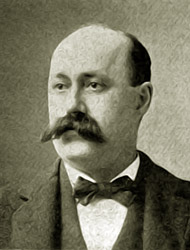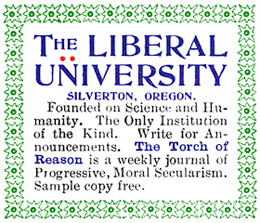By W. E. Johnson — April, 1899
 For two thousand years it has been the fashion of this earth to denounce as “infidels” all who do not endorse one’s particular brand of theology. Christians denounce the Mohammedans as “infidels” and “heathen,” notwithstanding the fact that the Muslims worship the same God and do reverence to the Christian “Savior.” The Muslims get back at the Christians by denouncing them as “infidels” and “dogs.” Orthodox Christians denounce the unorthodox as “infidels.” The Catholics brand all Protestants as “infidels.” The Unitarians are “infidels” in the eyes of most every other denomination. Every man who gets a new idea is straightway classed as an “infidel.” In our own country the Quakers have been denounced as “infidels” for two hundred years. Rev. Cotton Mather, that cheerful old cutthroat, even urged that they be killed for their property. Every abolitionist, from William Lloyd Garrison down, was denounced by preachers on account of their “infidelity.”
For two thousand years it has been the fashion of this earth to denounce as “infidels” all who do not endorse one’s particular brand of theology. Christians denounce the Mohammedans as “infidels” and “heathen,” notwithstanding the fact that the Muslims worship the same God and do reverence to the Christian “Savior.” The Muslims get back at the Christians by denouncing them as “infidels” and “dogs.” Orthodox Christians denounce the unorthodox as “infidels.” The Catholics brand all Protestants as “infidels.” The Unitarians are “infidels” in the eyes of most every other denomination. Every man who gets a new idea is straightway classed as an “infidel.” In our own country the Quakers have been denounced as “infidels” for two hundred years. Rev. Cotton Mather, that cheerful old cutthroat, even urged that they be killed for their property. Every abolitionist, from William Lloyd Garrison down, was denounced by preachers on account of their “infidelity.”
Abraham Lincoln was declared an “infidel.” Thomas Jefferson was railed at for his “infidelity” and his co-worker in the cause of independence, Thomas Paine, was slandered as an “infidel,” and has been lied about by foul-mouthed preachers for a hundred years, simply because he was an unbeliever. Benjamin Franklin, another “infidel,” was likewise denounced. Galileo, who started the earth in motion around the sun, was hauled before the priesthood for his “infidelity.” Bruno, who asserted that man had some rights as against the clergy, was burned at the stake by “servants of the Most High,” all for his unbelief. Even the beer-guzzling Martin Luther was chased all over Germany because he gave up a few of his superstitions and thus became an “infidel.”
Back to history’s birth religion has pursued with sword and flame all who dared to dissent. For a thousand years Europe was lit with the bonfires of heretics. When the Catholics were in power, the Protestants were the “infidels.” When the Protestants were in power, the Catholics suffered as the “infidels.” Quakers were always “infidels” because they were never in power. Whoever lifted his voice against the powers that were, was an “infidel,” and in danger of his life. Whoever drew his sword against wrong, against ignorance, against superstition, against injustice, was an “infidel” and “one possessed of the devil.” Monks and preachers would pounce upon him like famishing wolves.
Jesus of Nazareth was the original “infidel.” He was the first dissenter. He was the first heretic. He lived the life of an “infidel.” He preached the “infidels'” gospel, charity and free thought. The theologians of his day lied about him, they plotted against his life, they spit on him, they struck him with whips, they bribed his friends, they boycotted and terrified his disciples, they denounced him for his “unbelief.” Jesus, I say, led an “infidel’s” life; he died an “infidel’s” death. In after centuries, when his despised cause had been suffocated with the rites of the church, when his gospel had been strangled with the superstitions of theologians, when freaks had engrafted upon his philosophy the creeds and flummeries of the rituals, his false followers became the “orthodox,” and the other fellows the “infidels.” That sermon which the Nazarene preached on the mountain, though choked and disfigured by interpolations and forgeries of clergymen, has come down through the ages, a masterpiece of human ethics.
After his alleged baptism by John, that grasshopper-eating lunatic, Jesus at once entered upon his career of antagonism of the preachers. While Palestine nominally was a Roman province, the local governors were wont to allow the local authorities to do pretty much as they chose, as long as they paid their taxes. The priesthood was therefore practically supreme. Palestine was a theocracy. The preachers both executed and interpreted the laws.
In his “sermon on the mount,” Jesus not only directly challenged the orthodoxy of his times but sailed into the clergymen after this fashion:
“Except your righteousness shall exceed the righteousness of the scribes and Pharisees, ye shall in no case enter the kingdom of heaven!”
From that hour his life was a continual struggle against the “believers” of his day. As old Cotton Mather said of the Quakers, these preachers said this agitator from Nazareth was “possessed of the devil.”
When Jesus picked a little corn on the Sabbath, the preachers howled and wanted to enforce the “Sunday laws” on him.
When he ate dinner without “washing his hands,” according to the rites of the church, Jesus was again “called down” by the ministers.
When he practiced a little medicine on Sunday, he again incurred the maledictions of the believers. On several occasions matters got so hot that Jesus skipped out to avoid trouble.
Jesus went square against the church on the divorce question, and had various disputes with the clergy about it.
Jesus ate pie with his knife after the manner of the common herd, and the preachers denounced him as a “glutton.” It appears that he took a drink of something red, and the preachers howled out that he was a ”wine bibber.”
A committee of preachers waited on him at Jerusalem and demanded to know why his disciples transgressed the “traditions of the elders,” whereupon Jesus the unbeliever practically told them that it was none of their business.
There is scarcely a chapter in the first three gospels that does not narrate some scrap that Jesus had with the preachers. The Book of Matthew is particularly filled with these cat fights with the theologians.
When Jesus made that triumphal entry into Jerusalem on a stolen jackass the end of his stormy career was in sight. Upon his arrival he strode into the Temple, kicked over the tables, chased the money-brokers out of the hallways and upset the poultry coops. That night he went out to Bethany, where lodging was cheaper, and in the morning returned to Jerusalem looking for more trouble. The ministers demanded to know “by what authority” he created all this racket. “Publicans and harlots will go into the kingdom before you,” savagely retorted Jesus.
The preachers tried to pick a quarrel between him and the tax collector. They sent a lawyer to cross-question him on technical points.
They again and again plotted against his life, but could not find a murderer whom they dared trust with the job of killing him. Finally, after several days of contention, Jesus broke loose on the preachers in one of his speeches in the following furious tirade, which may be found in the 23rd. chapter of Matthew:
“Woe unto you, scribes and Pharisees, hypocrites! for ye shut up the kingdom of heaven against men; for ye neither go in yourselves, neither suffer them that are entering to go in. Woe unto you, scribes and Pharisees, hypocrites! for ye devour widows’ houses, and for a pretense make long prayer; therefore ye shall receive the greater damnation. Woe unto you, scribes and Pharisees, hypocrites; for ye compass sea and land to make one proselyte, and when he is made, ye make him twofold more the child of hell than yourselves. Ye blind guides that strain at a gnat and swallow a camel. Woe unto you, scribes and Pharisees, hypocrites! for ye make clean the outside of the cup and the platter, but within they are full of extortion and excess. Woe unto you, scribes and Pharisees, hypocrites! for ye are like unto whited sepulchers, which indeed appear beautiful outward, but are within full of dead men’s bones, and of all un-cleanliness. Even so ye outwardly appear righteous unto men, but within ye are full of hypocrisy and iniquity. Wherefore be ye witnesses unto yourselves, that ye are the children of them which killed the prophets. Ye serpents, ye generation of vipers, how can ye escape the damnation of hell?”
After this furious philippic by Jesus, the enraged preachers held a mass meeting at the house of the high priest, Caiaphas, to devise means of getting away with the troublesome “infidel.” As an outcome of this meeting, Jesus was arrested, or, rather, kidnapped, arraigned before the high priest and cross-examined. When the prisoner refused to answer questions, Caiaphas tore his shirt and spit on the “infidel” with true clerical instinct. This was the beginning of the end. Even the Roman governor could not withstand the mob of Jew ministers. In order to keep the public peace, Jesus was sent to Golgotha, just as Dreyfus was sent to Devil’s Island a few years ago.
Whatever may be said of Jesus to his disadvantage, we must remember that what we know of him has filtered through two thousand years of theological quackery, through a thousand years of drunken, licentious monks, popes, priests and preachers; that for what we know, things have been put into his mouth that he never uttered and that claims have been made for him that he never made. But we do know that the whole story of his life was a protest against corrupt theologians; that his whole life was devoted to a warfare against the preachers of his day and their corruption, that in the end he met a horrible death at the hands of the clergymen, and that when his cause became more popular than that of the preachers, the ministers seized upon it as a basis for a new religion.
After sacrificing his life in bitter warfare against the creeds and corrupt priestly hierarchy of his times, is it not fair that we, who are now engaged in precisely the same work, should recognize the value of his life in the cause of Free Thought?
Is not Jesus richly worthy of the title, “the original infidel?” if not, why not?





